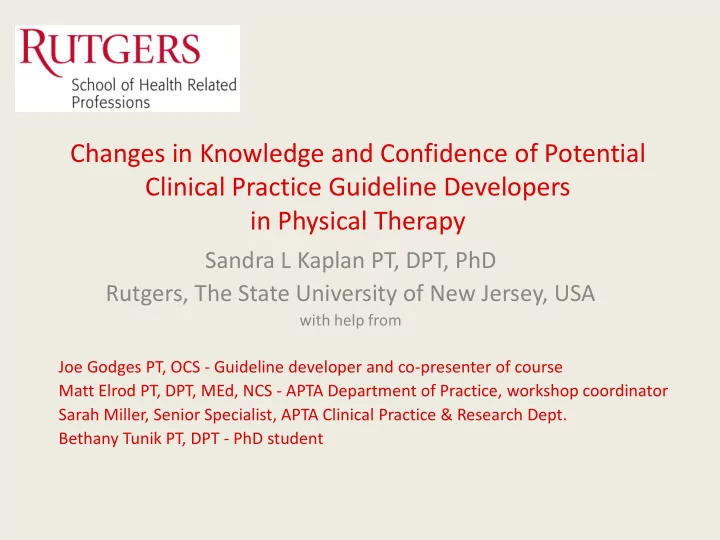

Changes in Knowledge and Confidence of Potential Clinical Practice Guideline Developers in Physical Therapy Sandra L Kaplan PT, DPT, PhD Rutgers, The State University of New Jersey, USA with help from Joe Godges PT, OCS - Guideline developer and co-presenter of course Matt Elrod PT, DPT, MEd, NCS - APTA Department of Practice, workshop coordinator Sarah Miller, Senior Specialist, APTA Clinical Practice & Research Dept. Bethany Tunik PT, DPT - PhD student
Organic History of the Need for CPGS in PT • American Physical Therapy Association (APTA) - promoting EBP in curricula • California PTs – needed guidelines to support payment • Joe Godges and James Irgang (PTs) - long term plan for the APTA Orthopedic Section to develop guidelines – Divided the body into parts and set up CPG groups – Currently have 8 CPGS published: Ankle Sprain, Adhesive Capsulitis, Neck Pain, Low Back Pain, Hip Osteoarthritis, Meniscal and Articular Cartilage Lesions, Knee Ligament Sprain, Achilles Tendinitis, Plantar Fascitis • APTA Pediatric Section - Knowledge Translation Task Force (SLK - Chair) generated suggestions, including developing CPGs – First CPG team began meeting in 2010 (SLK - GDG leader) – 1st CPG published in 2013 on Congenital Muscular Torticollis. – SoP guidelines for developing CPGs published, 2013
APTA Initiatives • Foster the use of evidence based practice • Facilitate moving knowledge into practice • Facilitate development of CPGS – Joe Godges and I - invited to develop a workshop for CPG teams. – July 2012 - 1st workshop with 12 teams from 11 Sections (n=30); 1 revision team – July 2013 - 2nd workshop with 12 Teams with representatives from 14 Sections (n=36)
Workshop Structure • Teams of 2-3 members supported to attend • 2.5 day program – Day 1 - Big picture of Section roles, capacity development – Day 2 - Nitty gritty of CPG development process – Day 3 - Publication and post publication processes • Blueprint workbook – Lecture followed by discussion/consultation time within teams to identify plans and resources, or questions that need follow- up by Section leadership or other team members. – Teams documented plans and questions in their workbook – Submitted for continuing education credits – JG and SK provided post workshop suggestions for blueprint
Foci of the Presentation • Measures of short term changes on 26 questions – Likert scales 1-5 – Knowledge of CPG development steps • Have done this - Don’t know how – Confidence to execute the CPG development steps • Confident I can complete this step – Not confident I can complete this step
The Participants • 2013 • 2012 • 36 individuals • 30 Individuals • 14 APTA Sections • 11 APTA Sections – Acute Care – Acute Care – Aquatic – Cardiopulmonary – Cardiopulmonary – Federal – Electro/wound Management – Geriatrics – Federal – Hand Rehabilitation – Geriatrics – Home Health – Hand Rehabilitation – Neurology – Health Policy – Oncology – Neurology – Orthopedics – Oncology – Pediatrics – Orthopedics – Women’s Health – Research – Sports – Women’s Health
2012 Pre-Post Workshop Levels (n= 29) Possible range of total score 26-130 Post Pre Knowledge Knowledge Response range 1.77 - 4.07 Response Range 1.55 - 2.39 Average Total Score = 74.21 (SD=17)* Average Total Score = 51.38 (SD=11)* Pre Post Confidence Confidence Response range 1.97 – 3.45 Response range 1.52 – 2.32 Average Total Score = 71.93 (SD=19)* Average Total Score = 49.10 (SD=14)* Lower scores = higher ratings of knowledge and confidence, • p=.000 8 of 10 groups are developing a CPG or other guidance document.
2013 Pre-Post Workshop Levels (n=24) Possible range of total score 26-130 Post Pre Knowledge Knowledge Response range 2.24 - 4.18 Response Range 1.87 - 2.80 Average Total Score = 85.12 (SD=18)* Average Total Score = 60.37 (SD=13)* Pre Post Confidence Confidence Response range 2.36 - 3.88 Response range 1.91 - 2.63 Average Total Score = 82.41 ( SD=20)* Average Total Score = 58.20 (SD=20)* Lower scores = higher ratings of knowledge and confidence, * p=.000
Workshop Effectiveness • Increased perceived knowledge & confidence for developing CPGs – Highest Baseline Skills Comfort • Searching • Critical appraisal and synthesis – Lowest Baseline Skills Comfort • Organizational strategies • Conflict of interest disclosures • Post publication tasks • Training younger CPG contributors • Teams effectively grappled with: – Identifying resources – Defining or narrowing the scope of an intended CPG – Weighing organizational strategies • Individual Section representatives – Determined broader planning issues and strategies for Section – Identified possible collaborating Sections
Our big “Aha” Many Sections Move the Profession 1 APTA Section Section Representatives Individual PTs 1 GDG 1 CPG Many PTs Many patients Other Clinicians
Future Plans • February 2014 - meet with interested groups at professional annual meeting to: – Provide support – Answer questions specific to the phase of development for CPG teams – Meet with Section leadership about support and planning • Fiscal planning for GDG support, publication • Topic selection • Capacity building • Grants to support CPG development – 5 Grants awarded in 2012-2013 (September + March) – 2 Grants submitted in 2013 (September) (Another call in March) • Critical appraiser training • Development of quantitative critical appraisal tools – Experimental interventions - pilot testing now
Questions and Comments? Many Thanks to the EBHC Conference Organizers for this Opportunity sandra.l.kaplan@shrp.rutgers.edu
Recommend
More recommend